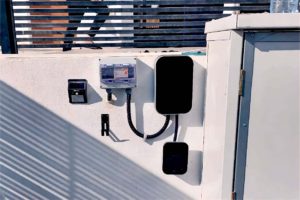Choosing the right EV charge station for your home is an important decision. This post will explain the different types of stations available and help you find one that meets your needs and budget.

Understand Your EV Charging Needs
When choosing an EV charge station, it’s important to consider your needs and the number of cars you own. Take stock of the available ports offered by your charger and make sure that it will be able to accommodate different types of plugs. Additionally, consider how long you need to charge each car as well as the amount of power you’ll need; if your car requires high-power charging or has a battery capacity over 60kWh, you may want a Level 2 charger with a higher output than a standard Level 1 model. Understanding all these factors will go a long way toward helping you find the best charging station for your home.
You’ll also want to take some time to check out the charging station company’s customer service. You may need technical support or assistance with other issues regarding your EV charger. It’s important to have someone on hand who can answer any questions that you might have. Additionally, make sure the company you purchase your charge station from has a good warranty and guarantees its product for a certain length of time. A reputable EV charger manufacturer will provide good customer service and a reliable product as well as help you choose the perfect charger for your specific needs.
Explore Your Options for Level 1 and Level 2 Chargers
Once you know your charging needs, you can start researching and comparing the available options. Level 1 and Level 2 chargers are two of the most commonly used types of EV charging stations. Level 1 chargers are portable or wall-mounted and often come with an adapter that can be plugged into a standard 120v outlet. Level 2 chargers require high voltage power, generally 240V-480V, and can charge cars faster than level 1 chargers. Keep in mind that higher voltage levels may cost more upfront, but are recommended for a better overall charging experience.
Level 2 EV charging stations can come with a variety of features, such as WiFi connectivity, credit card readers, and weatherproofing. For extra convenience, many chargers can be plugged into exterior outlets and are able to be locked so no one else can use them. Some level 2 chargers even allow you to control the current and voltage remotely in order to ensure efficient charging. No matter which type of EV charger you choose, it’s important that you find an option that best meets your needs for power and convenience.
Check Your Electrical System’s Capacity
Before purchasing or installing an EV charging station, it is important to ensure that your home electrical system is able to handle the additional power demands. The station will require an outlet rated for the amperage draw that your EV requires and will likely need a dedicated circuit. Knowing your home’s electrical load capacity can help you determine which EV charger is not only best for your car but also most appropriate for your home and its available energy resources.
To know what kind of station you can use in your home, you should hire a licensed electrician to inspect your electrical panel and measure the power draw of all the circuits. They will need to check how much energy is running through each circuit and whether it is rated for the maximum amps that you require for charging. An electrician can also advise if any upgrades or modifications are necessary to support an EV charger in your home.
Choose a Smart Home-Charging Station
When selecting an EV charge station for your home, you may want to go with a “smart” version. These offer digital connectivity and monitoring capabilities through an app or website. Smart chargers come with several advanced features like charging on-demand and tracking your vehicle battery’s status. You can also set schedules for when you’d like the car to start and stop charging, as well as receive notifications for your charging status and updates on energy use.
A smart charger is more expensive than a standard model, but it offers a number of benefits that can help maximize the lifespan and performance of your EV battery while streamlining the process of recharging. Most units can be controlled remotely via your smartphone or computer, allowing you to manage your charging times even when you’re away from home – great for taking advantage of off-peak electricity rates. Plus, with integrated diagnostics, many models can detect problems with your battery and alert you to any potential issues before they become an issue.
Consider Installation Costs and Other Factors When Selecting an EV Charger Station
Before settling on a charger, consider all the factors involved, such as installation costs and the input voltage of your home’s electrical system. You should also look into its compatibility with different cars. Some charge stations come with standard connectors that fit any car, while others require a specific type of plug. You may want to invest in one that is compatible with both existing and future vehicles. Additionally, take a look at the safety features of each charger to verify it meets all requirements for safety standards.
It is also important to take into account the extra features of the charger, such as programmable start times which allow you to schedule charging times when electricity rates are lower. Some chargers are equipped with digital meters that let you keep track of your energy use for faster billing and cost estimates. The power output of the charger should be sufficient for your needs too; higher outputs can charge more quickly than a slower rate. Ultimately, it’s best to consult a professional electrician to ensure your home is properly prepared for EV charging and select the charger that meets all your needs.





